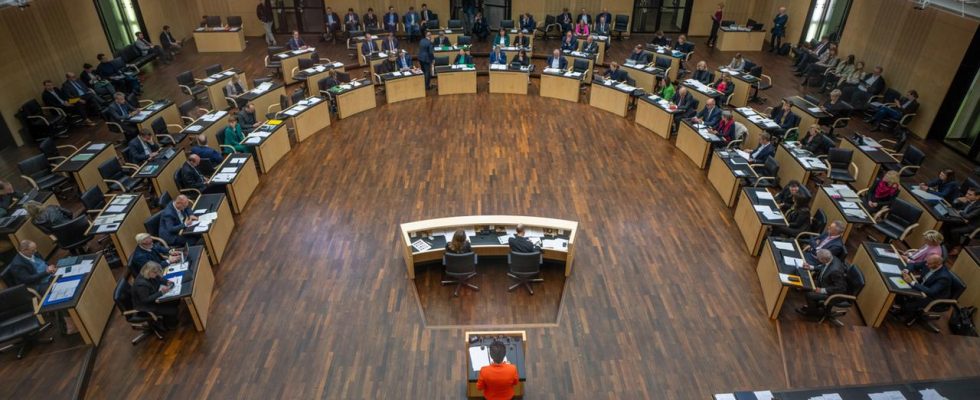The dispute over the Growth Opportunities Act is to be resolved in the Mediation Committee today. But there is no great hope for a breakthrough. The Union insists on a return of subsidies for farmers.
The mediation committee of the Bundestag and Bundesrat is supposed to seek a solution to the dispute over the Growth Opportunities Act today – but the prospect of success is dim, the fronts have instead hardened.
The traffic light government’s proposal provides for a series of reliefs for companies amounting to three billion euros per year. The Union only wants to agree to the project if the federal government reverses the gradual elimination of agricultural diesel subsidies for farmers.
Lindner and Klingbeil: Union should give up “blockade”.
Before the committee’s deliberations, Federal Finance Minister Christian Lindner (FDP) and SPD leader Lars Klingbeil called on the Union parties to allow the tax relief to pass. “I appeal to the Union to stop blocking the Growth Opportunities Act,” said Lindner to the Germany editorial network. Klingbeil told the Rheinische Post: “If the Union is serious about its fully formulated ambitions for a strong economy, it must now give up its blockade in the Federal Council.”
Lindner argued: “Our companies deserve relief. This is the only way we can create new dynamics in our country.” “Further growth impulses” are needed, which makes it all the more important “that the law is now in the legal gazette quickly.”
Union demands movement of traffic lights
The Union, on the other hand, called on the traffic lights to move. Union faction deputy Mathias Middelberg said in an interview with the dpa news agency: “A compromise is feasible and possible.” However, this would also have to include a solution for agricultural diesel. “The traffic lights still have to move a little bit. But we have also moved very far towards the traffic lights as far as the overall package is concerned.” If an agreement does not work, the traffic light is responsible.
Middelberg said that in principle he sees good chances for an agreement. A package was negotiated that included a total of 3.2 billion in relief annually. The federal government had actually planned relief of seven billion euros. However, the package became smaller during the mediation process because the states did not want to co-finance relief at the original level.
Middelberg called the accusation that the Union was blocking the law “complete nonsense.” The mediation committee was called upon by all countries – both those in which the Union governs and those in which the SPD and the Greens govern. It is also not irrelevant that the Union is now linking the growth package with the issue of agricultural diesel. “If it’s about relief for the economy as a whole, then it can’t be the case that you’re now counter-financing it by putting a burden on a small, particularly medium-sized industry in return. It can’t be the case that the farmers “Pay the burden on the German economy as a whole.”
Cities demand improvement
Meanwhile, German cities demanded significant improvements to the law. “After painful cuts in the 2024 budget, the municipalities cannot cope with further billions in tax losses due to the Growth Opportunities Act,” said the general manager of the German Association of Cities, Helmut Dedy. “That would tear the ground from under our feet.” It is right that the countries intervened. The Federal Council had blocked the project with various tax breaks for companies on the grounds that the states would have to bear a large part of the costs.
“It is particularly important to us that the trade tax is not reduced unilaterally,” said Dedy. The financial situation of the municipalities is already deteriorating dramatically. At the same time, they would have to invest in climate protection, education, heating transition and digitalization. Without changes, the growth package would, according to the City councils at the local level will lead to tax losses of nine billion euros by 2027. In the mediation process, the volume of relief has already been reduced from the previously planned seven billion euros annually to 3.2 billion euros.
Scholz and Habeck for quick agreement
Despite all the calls for movement, the fronts in front of today’s mediation committee have hardened. An adjournment would not be a problem because the Federal Council will not meet again until March 22nd, according to the Reuters news agency. If an agreement between the federal and state governments fails, a new working group could be set up to negotiate a compromise on the agricultural issue.
Chancellor Olaf Scholz nevertheless called for a quick agreement. It would be good if the Growth Opportunities Act were passed quickly despite all the political conflicts, said the SPD politician at an employer association event in Berlin. It would bring relief for small and large companies. Federal Economics Minister Robert Habeck also pushed for an agreement. “That has to happen now,” said the Green politician.
Lindner is probably planning “Economic turnaround”-Concept
Meanwhile, the “Bild” newspaper reported, with reference to FDP faction circles, that Lindner wanted to present an “economic turnaround” concept at a meeting with Chancellor Olaf Scholz (SPD) and Economics Minister Robert Habeck (Greens) in the next three weeks. The package should contain key points such as relieving the burden on companies and citizens and reducing bureaucracy. According to the report, Habeck also wants to submit his own paper.
Michael Weidemann, ARD Berlin, tagesschau, February 20, 2024 6:23 p.m

